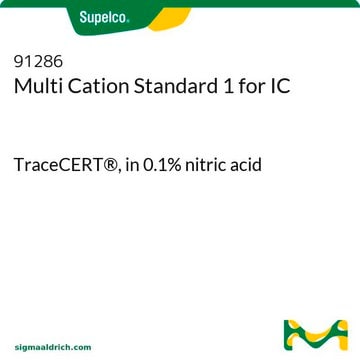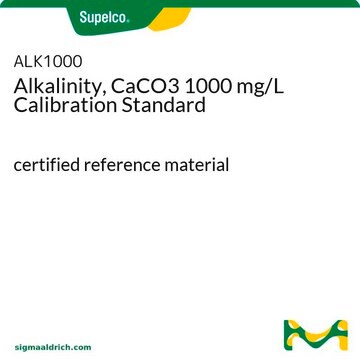68487
Oxalic acid concentrate
0.1 M (COOH)2 (0.2N), eluent concentrate for IC
Synonym(s):
Oxalic acid solution
Sign Into View Organizational & Contract Pricing
All Photos(1)
About This Item
Linear Formula:
HOOCCOOH
CAS Number:
Molecular Weight:
90.03
MDL number:
UNSPSC Code:
12161700
PubChem Substance ID:
NACRES:
NB.21
Recommended Products
Quality Level
form
liquid
concentration
0.1 M (COOH)2 (0.2N)
technique(s)
ion chromatography: suitable
SMILES string
OC(=O)C(O)=O
InChI
1S/C2H2O4/c3-1(4)2(5)6/h(H,3,4)(H,5,6)
InChI key
MUBZPKHOEPUJKR-UHFFFAOYSA-N
Looking for similar products? Visit Product Comparison Guide
Application
Metrohm IC application note AN-C-139: Cations andamines in the water-steam cycle.
Metrohm IC application note AN-C-138: Zinc,nickel, calcium, and magnesium in borated water of a pressurized water reactor(PWR).
Metrohm IC application note AN-C-113:Determination of lysine and standard cations in a lysine sample.
Metrohm IC application note AN-C-138: Zinc,nickel, calcium, and magnesium in borated water of a pressurized water reactor(PWR).
Metrohm IC application note AN-C-113:Determination of lysine and standard cations in a lysine sample.
Linkage
Visit the IC Portal to learn more
related product
Product No.
Description
Pricing
Storage Class Code
12 - Non Combustible Liquids
WGK
nwg
Flash Point(F)
Not applicable
Flash Point(C)
Not applicable
Personal Protective Equipment
dust mask type N95 (US), Eyeshields, Gloves
Choose from one of the most recent versions:
Already Own This Product?
Find documentation for the products that you have recently purchased in the Document Library.
Customers Also Viewed
L K Massey et al.
Journal of agricultural and food chemistry, 49(9), 4262-4266 (2001-09-18)
Consumption of soybeans and food products made from them is increasing because of their desirable nutritional value. However, the oxalate content of seeds from 11 cultivars of soybean showed relatively high levels of total oxalate from 0.67 to 3.5 g/100
Y Nakagawa et al.
The Journal of clinical investigation, 76(4), 1455-1462 (1985-10-01)
One reason that some people are prone to calcium oxalate nephrolithiasis is that they produce urine that is subnormal in its ability to inhibit the growth of calcium oxalate crystals. We have identified in human urine a glycoprotein (GCI) that
R de Water et al.
American journal of kidney diseases : the official journal of the National Kidney Foundation, 33(4), 761-771 (1999-04-09)
Urinary calcium oxalate (CaOx) crystals and crystal agglomerates are normally harmlessly excreted, but in nephrolithiasis they are retained by tubular epithelial cells and shifted into the renal interstitium. This crystalline material induces an inflammatory response consisting of an increase in
G M Gadd
Advances in microbial physiology, 41, 47-92 (1999-09-29)
The production of organic acids by fungi has profound implications for metal speciation, physiology and biogeochemical cycles. Biosynthesis of oxalic acid from glucose occurs by hydrolysis of oxaloacetate to oxalate and acetate catalysed by cytosolic oxaloacetase, whereas on citric acid
A Amoroso et al.
Journal of the American Society of Nephrology : JASN, 12(10), 2072-2079 (2001-09-20)
Primary hyperoxaluria type 1 (PH1) is an autosomal recessive disorder that is caused by a deficiency of alanine: glyoxylate aminotransferase (AGT), which is encoded by a single copy gene (AGXT). Molecular diagnosis was used in conjunction with clinical, biochemical, and
Our team of scientists has experience in all areas of research including Life Science, Material Science, Chemical Synthesis, Chromatography, Analytical and many others.
Contact Technical Service








